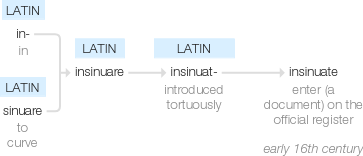Insinuate
early 16th century (in the sense ‘enter (a document) on the official register’): from Latin insinuat- ‘introduced tortuously’, from the verb insinuare, from in- ‘in’ + sinuare ‘to curve’.
wiktionary
From Latin īnsinuō(“to push in, creep in, steal in”), from in(“in”) + sinus(“a winding, bend, bay, fold, bosom”)
etymonline
insinuate (v.)
1520s, "to covertly and subtly introduce into the mind or heart" (trans.), from Latin insinuatus, past participle of insinuare "to thrust in, push in, make a way; creep in, intrude, bring in by windings and curvings, wind one's way into," from in- "in" (from PIE root *en "in") + sinuare "to wind, bend, curve," from sinus "a curve, winding" (see sinus).
Intransitive meaning "hint obliquely" is from 1560s. Meaning "maneuver (someone or something) into some desired position or condition" is from 1570s. Physical or literal sense of "to introduce tortuously or indirectly" is from 1640s. Related: Insinuated; insinuating.
